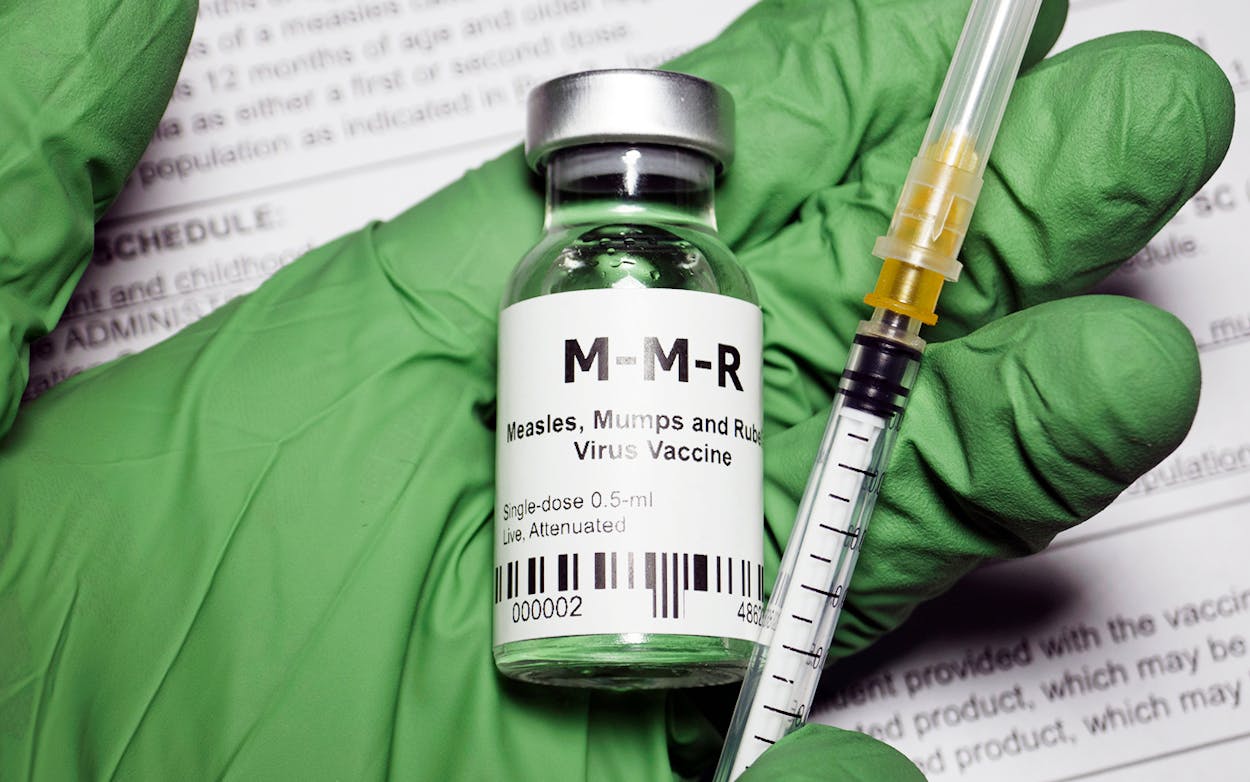A study from the University of Texas and Johns Hopkins University, published last week, looked at the measles resurgence in the U.S. There are a few takeaways from it, but the one that might inspire the most self-reflection from Texans is that, of the 25 counties in the U.S. at highest risk of an outbreak, three of them are right here: Harris, Tarrant, and Travis.
The last time we wrote about this, back in early February, when Houston saw its first outbreak, the 79 cases across the country to date suggested that we were on pace to see as many as 948 cases this year. We’re almost certainly going to blow well past that number, though. Through April 26, the U.S. has already accumulated 704 measles cases—almost as many as the total number reported from 2015 to 2018. At the current pace, we would end the year with more than 2,000 cases. But that’s probably a conservative estimate, given the way diseases spread and the exponential rate of growth we’ve already seen. A 2018 study from the Public Library of Science similarly identified Harris, Tarrant, and Travis counties (with Collin thrown in the mix too) as risky places for those lacking herd immunity from the once-eradicated disease.
So why are the Houston, Fort Worth, and Austin areas seeing a resurgence in measles? Historically, unvaccinated people tended to either be impoverished or from groups who won’t vaccinate for religious reasons. Those three Texas counties are neither impoverished nor particularly religious. And culturally, the stereotypes around people in Tarrant County—the most reliably conservative urban county in the country—and those in Travis (the hippie-dippie “blue dot” in red Texas) have little overlap.
One area where they do overlap, though, is a general distrust of authority and conventional wisdom. In Tarrant County, many folks might be listening to leaders like state representative Jonathan Stickland, who attacked doctor/author Peter Hotez’s advocacy for vaccines as “sorcery.” In Austin, meanwhile, many people listen to folks like Robert F. Kennedy Jr., whose own family has taken a public stance against his position on vaccines. We are a starkly divided country, it’s true, but the fringes on both the left and the right hold “Don’t trust people in authority who claim to know what’s best for you” as a popular guiding philosophy. On vaccines, an antiauthoritarian, science-doubting stance has made common cause between some folks in a conservative county like Tarrant and a liberal one like Travis.
There’s long been debate over whether anti-vaxxing views fall more on the left or right side of the political spectrum, but thinking about it in those terms is too simplistic—it’s less about left/right and more about folks who distrust experts and view “nature” as an objective good and not also as the place diseases come from. Anti-vaxxers are convinced that people with authority would stop at nothing to control them. That’s a strain of thought that exists on both sides, and vaccinations are one of the rare issues that both dreadlocked hippie moms swimming topless at Barton Springs and SUV-driving suburban moms who take their kids to Eagle Mountain International Church can agree on. There’s not a ton of overlap, as a rule, between the “Don’t trust anything you’ve been told” left and the “Don’t trust anything you’ve been told” right, but vaccines fall right in the center of that particular Venn diagram. But as measles spreads, communities on both sides of the political divide are likely to learn the risks of that line of thought.
Correction: The original version of this story stated that Texas had accumulated 704 measles cases so far this year. In fact, that figure was for the whole United States. The story has been updated. We apologize for the error.
- More About:
- Politics & Policy
- Health
- Houston
- Fort Worth
- Austin








